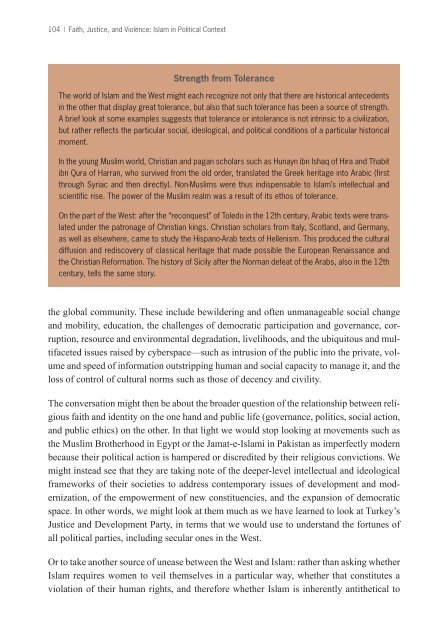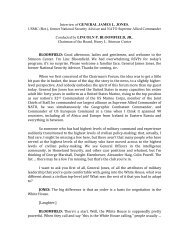Islam and Politics - The Stimson Center
Islam and Politics - The Stimson Center
Islam and Politics - The Stimson Center
Create successful ePaper yourself
Turn your PDF publications into a flip-book with our unique Google optimized e-Paper software.
104 | Faith, Justice, <strong>and</strong> Violence: <strong>Islam</strong> in Political Context<br />
Strength from Tolerance<br />
<strong>The</strong> world of <strong>Islam</strong> <strong>and</strong> the West might each recognize not only that there are historical antecedents<br />
in the other that display great tolerance, but also that such tolerance has been a source of strength.<br />
A brief look at some examples suggests that tolerance or intolerance is not intrinsic to a civilization,<br />
but rather reflects the particular social, ideological, <strong>and</strong> political conditions of a particular historical<br />
moment.<br />
In the young Muslim world, Christian <strong>and</strong> pagan scholars such as Hunayn ibn Ishaq of Hira <strong>and</strong> Thabit<br />
ibn Qura of Harran, who survived from the old order, translated the Greek heritage into Arabic (first<br />
through Syriac <strong>and</strong> then directly). Non-Muslims were thus indispensable to <strong>Islam</strong>’s intellectual <strong>and</strong><br />
scientific rise. <strong>The</strong> power of the Muslim realm was a result of its ethos of tolerance.<br />
On the part of the West: after the “reconquest” of Toledo in the 12th century, Arabic texts were translated<br />
under the patronage of Christian kings. Christian scholars from Italy, Scotl<strong>and</strong>, <strong>and</strong> Germany,<br />
as well as elsewhere, came to study the Hispano-Arab texts of Hellenism. This produced the cultural<br />
diffusion <strong>and</strong> rediscovery of classical heritage that made possible the European Renaissance <strong>and</strong><br />
the Christian Reformation. <strong>The</strong> history of Sicily after the Norman defeat of the Arabs, also in the 12th<br />
century, tells the same story.<br />
the global community. <strong>The</strong>se include bewildering <strong>and</strong> often unmanageable social change<br />
<strong>and</strong> mobility, education, the challenges of democratic participation <strong>and</strong> governance, corruption,<br />
resource <strong>and</strong> environmental degradation, livelihoods, <strong>and</strong> the ubiquitous <strong>and</strong> multifaceted<br />
issues raised by cyberspace—such as intrusion of the public into the private, volume<br />
<strong>and</strong> speed of information outstripping human <strong>and</strong> social capacity to manage it, <strong>and</strong> the<br />
loss of control of cultural norms such as those of decency <strong>and</strong> civility.<br />
<strong>The</strong> conversation might then be about the broader question of the relationship between religious<br />
faith <strong>and</strong> identity on the one h<strong>and</strong> <strong>and</strong> public life (governance, politics, social action,<br />
<strong>and</strong> public ethics) on the other. In that light we would stop looking at movements such as<br />
the Muslim Brotherhood in Egypt or the Jamat-e-<strong>Islam</strong>i in Pakistan as imperfectly modern<br />
because their political action is hampered or discredited by their religious convictions. We<br />
might instead see that they are taking note of the deeper-level intellectual <strong>and</strong> ideological<br />
frameworks of their societies to address contemporary issues of development <strong>and</strong> modernization,<br />
of the empowerment of new constituencies, <strong>and</strong> the expansion of democratic<br />
space. In other words, we might look at them much as we have learned to look at Turkey’s<br />
Justice <strong>and</strong> Development Party, in terms that we would use to underst<strong>and</strong> the fortunes of<br />
all political parties, including secular ones in the West.<br />
Or to take another source of unease between the West <strong>and</strong> <strong>Islam</strong>: rather than asking whether<br />
<strong>Islam</strong> requires women to veil themselves in a particular way, whether that constitutes a<br />
violation of their human rights, <strong>and</strong> therefore whether <strong>Islam</strong> is inherently antithetical to

















